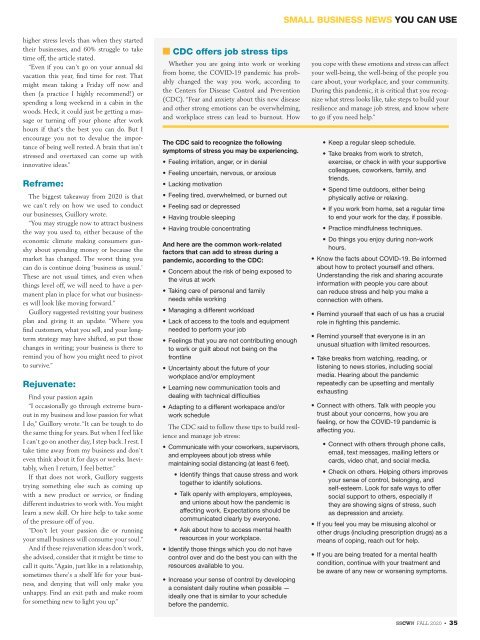You also want an ePaper? Increase the reach of your titles
YUMPU automatically turns print PDFs into web optimized ePapers that Google loves.
SMALL BUSINESS NEWS YOU CAN USE<br />
higher stress levels than when they started<br />
their businesses, and 60% struggle to take<br />
time off, the article stated.<br />
“Even if you can't go on your annual ski<br />
vacation this year, find time for rest. That<br />
might mean taking a Friday off now and<br />
then (a practice I highly recommend!) or<br />
spending a long weekend in a cabin in the<br />
woods. Heck, it could just be getting a massage<br />
or turning off your phone after work<br />
hours if that's the best you can do. But I<br />
encourage you not to devalue the importance<br />
of being well rested. A brain that isn't<br />
stressed and overtaxed can come up with<br />
innovative ideas.”<br />
Reframe:<br />
The biggest takeaway from 2020 is that<br />
we can't rely on how we used to conduct<br />
our businesses, Guillory wrote.<br />
“You may struggle now to attract business<br />
the way you used to, either because of the<br />
economic climate making consumers gunshy<br />
about spending money or because the<br />
market has changed. The worst thing you<br />
can do is continue doing ‘business as usual.’<br />
These are not usual times, and even when<br />
things level off, we will need to have a permanent<br />
plan in place for what our businesses<br />
will look like moving forward.”<br />
Guillory suggested revisiting your business<br />
plan and giving it an update. “Where you<br />
find customers, what you sell, and your longterm<br />
strategy may have shifted, so put those<br />
changes in writing; your business is there to<br />
remind you of how you might need to pivot<br />
to survive.”<br />
Rejuvenate:<br />
Find your passion again<br />
“I occasionally go through extreme burnout<br />
in my business and lose passion for what<br />
I do,” Guillory wrote. “It can be tough to do<br />
the same thing for years. But when I feel like<br />
I can't go on another day, I step back. I rest. I<br />
take time away from my business and don't<br />
even think about it for days or weeks. Inevitably,<br />
when I return, I feel better.”<br />
If that does not work, Guillory suggests<br />
trying something else such as coming up<br />
with a new product or service, or finding<br />
different industries to work with. You might<br />
learn a new skill. Or hire help to take some<br />
of the pressure off of you.<br />
“Don't let your passion die or running<br />
your small business will consume your soul.”<br />
And if these rejuvenation ideas don't work,<br />
she advised, consider that it might be time to<br />
call it quits. “Again, just like in a relationship,<br />
sometimes there's a shelf life for your business,<br />
and denying that will only make you<br />
unhappy. Find an exit path and make room<br />
for something new to light you up.”<br />
CDC offers job stress tips<br />
Whether you are going into work or working<br />
from home, the COVID-19 pandemic has probably<br />
changed the way you work, according to<br />
the Centers for Disease Control and Prevention<br />
(CDC). “Fear and anxiety about this new disease<br />
and other strong emotions can be overwhelming,<br />
and workplace stress can lead to burnout. How<br />
The CDC said to recognize the following<br />
symptoms of stress you may be experiencing.<br />
• Feeling irritation, anger, or in denial<br />
• Feeling uncertain, nervous, or anxious<br />
• Lacking motivation<br />
• Feeling tired, overwhelmed, or burned out<br />
• Feeling sad or depressed<br />
• Having trouble sleeping<br />
• Having trouble concentrating<br />
And here are the common work-related<br />
factors that can add to stress during a<br />
pandemic, according to the CDC:<br />
• Concern about the risk of being exposed to<br />
the virus at work<br />
• Taking care of personal and family<br />
needs while working<br />
• Managing a different workload<br />
• Lack of access to the tools and equipment<br />
needed to perform your job<br />
• Feelings that you are not contributing enough<br />
to work or guilt about not being on the<br />
frontline<br />
• Uncertainty about the future of your<br />
workplace and/or employment<br />
• Learning new communication tools and<br />
dealing with technical difficulties<br />
• Adapting to a different workspace and/or<br />
work schedule<br />
The CDC said to follow these tips to build resilience<br />
and manage job stress:<br />
• Communicate with your coworkers, supervisors,<br />
and employees about job stress while<br />
maintaining social distancing (at least 6 feet).<br />
• Identify things that cause stress and work<br />
together to identify solutions.<br />
• Talk openly with employers, employees,<br />
and unions about how the pandemic is<br />
affecting work. Expectations should be<br />
communicated clearly by everyone.<br />
• Ask about how to access mental health<br />
resources in your workplace.<br />
• Identify those things which you do not have<br />
control over and do the best you can with the<br />
resources available to you.<br />
• Increase your sense of control by developing<br />
a consistent daily routine when possible —<br />
ideally one that is similar to your schedule<br />
before the pandemic.<br />
you cope with these emotions and stress can affect<br />
your well-being, the well-being of the people you<br />
care about, your workplace, and your community.<br />
During this pandemic, it is critical that you recognize<br />
what stress looks like, take steps to build your<br />
resilience and manage job stress, and know where<br />
to go if you need help.”<br />
• Keep a regular sleep schedule.<br />
• Take breaks from work to stretch,<br />
exercise, or check in with your supportive<br />
colleagues, coworkers, family, and<br />
friends.<br />
• Spend time outdoors, either being<br />
physically active or relaxing.<br />
• If you work from home, set a regular time<br />
to end your work for the day, if possible.<br />
• Practice mindfulness techniques.<br />
• Do things you enjoy during non-work<br />
hours.<br />
• Know the facts about COVID-19. Be informed<br />
about how to protect yourself and others.<br />
Understanding the risk and sharing accurate<br />
information with people you care about<br />
can reduce stress and help you make a<br />
connection with others.<br />
• Remind yourself that each of us has a crucial<br />
role in fighting this pandemic.<br />
• Remind yourself that everyone is in an<br />
unusual situation with limited resources.<br />
• Take breaks from watching, reading, or<br />
listening to news stories, including social<br />
media. Hearing about the pandemic<br />
repeatedly can be upsetting and mentally<br />
exhausting<br />
• Connect with others. Talk with people you<br />
trust about your concerns, how you are<br />
feeling, or how the COVID-19 pandemic is<br />
affecting you.<br />
• Connect with others through phone calls,<br />
email, text messages, mailing letters or<br />
cards, video chat, and social media.<br />
• Check on others. Helping others improves<br />
your sense of control, belonging, and<br />
self-esteem. Look for safe ways to offer<br />
social support to others, especially if<br />
they are showing signs of stress, such<br />
as depression and anxiety.<br />
• If you feel you may be misusing alcohol or<br />
other drugs (including prescription drugs) as a<br />
means of coping, reach out for help.<br />
• If you are being treated for a mental health<br />
condition, continue with your treatment and<br />
be aware of any new or worsening symptoms.<br />
FALL 2020 • 35

















